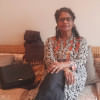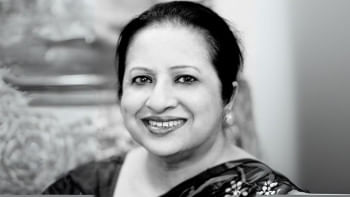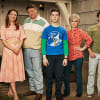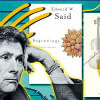Elegy on Andrew Eagle

Death, be not proud...
My dear friend, Andrew Eagle, passed away at the age of fifty, peacefully in his sleep in December 2024. Sleep on, Andrew, with your soul embraced by the bright, fragrant blooms of the eternal heavenly bower.
For me, now old and grey, with my seventieth birthday having passed in the first week of December, the news was a shock—like a blow to the head. Days of silent mourning followed. No tears. Only the endless reel of my mind playing scenes from decades of close connection with a gifted writer and a wonderful human being.
I first met Andrew in the mid-1990s at an International Conference on War, organised by the University of Dhaka's Department of English. The conference was held in the new auditorium of the under-construction Social Science building, next to Modhur Canteen. Fakrul Alam was the chairperson, and I was an associate professor with some influence and, I believe, modest writerly recognition.
I, of course, knew Andrew's work well. Both of us were regular contributors to The Daily Star—the literary page and the Friday weekend magazine—along with a close-knit group of academics and writers from my department: Niaz Zaman, Syed Manzoorul Islam, Kaiser Haq, and Fakrul Alam. But incredibly, I had never seen a photograph of Andrew. This was my fault, as I had been in Canada during the early '90s, often trapped in my own gloom and disconnected from events back home. I missed the overthrow of General Ershad.
Incidentally, I was one of the first to hear the breaking news of Rajiv Gandhi's assassination by a Tamil suicide bomber. I was sitting in my apartment at Dalhousie University, writing a term paper late at night with the transistor radio on low, so as not to disturb my neighbours through the thin walls. Stunned, I paced the floor for a while before calling my Tamil friend, the wife of a Commonwealth scholar who lived upstairs. She had become like a sister to me, and sharing that sorrow together eased the ache in my heart.
But I digress. Let me take you back to the auditorium. During the inaugural session, I sat in the front row in a black-and-white cotton sari, while Andrew stood out, noticeably, three tiers up to my right at almost a 20-degree angle. I turned around to nod a greeting, and I remember he was dressed smartly in a white shirt and black trousers. We exchanged smiles. During the tea- break at 11 o'clock, some of us leisurely walked into the Teacher's Lounge and sat in clumps to resume our beloved adda. Most befitting pastime for wordsmiths.
I am on a sofa with two others, seated directly opposite the open front door. I see Andrew lingering on the threshold, a bit nervous, hesitant to encroach into our hallowed space. I jumped up and quickly walked towards him, right hand held forth to shake his, smiled and said, " Please come in. Do sit and have tea with us. And...you are...?"
His reply, "I am Andrew Eagle" made me hoot with delight.
We next met on a coffee date at the Bangla Academy lawn one pleasant November evening during the Dhaka Literary Festival to chat and celebrate. I wanted to buy his co-authored book, APRIL. A true gentleman, Andrew paid for the coffee. However, to my chagrin, I did not have enough cash to pay the Tk 800 (only). I was so embarrassed. But being a quick-witted, pure-blood Dhakkaiya girl, I made a swap deal with my Hatiya younger brother: one medium-size jar of the notoriously famous Australian bread spread "Vegemite" from Melbourne on my next trip back from Down Under.
We met again—for me to hand over the promised jar—at the Daily Star (DS) Centre. Syed Mansur Hashim was then working as assistant editor at The Daily Star and was a responsible and valuable asset in his capacity for soliciting original pieces for the paper's special supplements. He also wrote occasional pieces for the newspaper. We three the DS nerds were very good friends. Mansur took us to the bustling staff cafeteria and treated us to wholesome snacks and hot beverages. An hour of fun and laughter, wit and banter. Sword-play with query and repartee.
One day, before the pandemic, Andrew visited me in my office (room no. 2058) as pre-arranged. He wanted to tour the arts faculty campus. We met with the current chairperson, Kajal Krishna Banerjee, who was a few years my junior as a colleague but two years my senior as an undergraduate. Kajal had returned after earning a doctorate in African literature from Jadavpur University. While the two men chatted, I went into the back room and retrieved a spare box of special ceramic mugs—white with a dark blue rim and the University of Dhaka logo. I had the peon discreetly deliver one to Banerjee. After refreshments, I planned to give one to Andrew as well.
The actual purpose of Andrew's visit was to pay homage to the hundreds of martyred students, massacred by the Pakistani army in genocidal gunfire in their campus residential halls in 1971. I cherish the privilege of guiding him to the green lawn and the effulgent new tree planted by Senator Edward Kennedy to honour the dead. As we all know, the original iconic Banyan tree, symbol and semiotic of the violent Language Movement since the 1950's, was chopped down by the Pakistani soldiers.
Andrew walked on the green grass. He sat under the tree. Touched the fresh bright green leaves. He walked back to the pavement on the edge of the lawn and handed me his smartphone to capture the image for posterity: Andrew in the foreground, with the majestic tree filling the landscape. I think to myself, as I click away several times, "What wondrous Inscape!"
The final volume of the esteemed journal SIX SEASONS Review (New Series, Vol. 6, No. 1, 201), edited by Fakrul Alam, contains just three non-fiction pieces. My memoir, "In My Place: Betwixt First Language and Mother Tongue" (pp. 87-92), appears at the top, followed by Somdatta Mondal's "American Individualism" (pp. 61-65), and Andrew Eagle's "Follow the Fish" (pp. 121-128) at the bottom. In his editor's note, Fakrul Alam writes, "Andrew Eagle's captivating account of his quest for a whale shark in the Maldives will certainly strike a familiar note for devotees of Melville's perennial classic Moby Dick.
However, what makes this farewell SSR issue unique, and a collector's item now is the concluding photography section, with Andrew's black and white photomontage of the "idyllic South Sea atoll in the Maldives." Five final photos are of Andrew chasing the whale.
On December 24, 2024, at 2:25 am my subdued heart throbbed with undying love for Andrew and I thought of lighting a candle on Xmas eve.
Let me end my elegy with Andrew's voice in "Follow the Fish":
"If I was a writer...
If I was a writer, with words would I scoop the hiss of Indian Ocean waves as they glide in and off the beach, beyond the balcony. ...the Maldivian sea is soul music.
'I'm still here', the island's ocean breathes..."
Rebecca Haque is professor of English at the University of Dhaka.
Views expressed in this article are the author's own.
Follow The Daily Star Opinion on Facebook for the latest opinions, commentaries and analyses by experts and professionals. To contribute your article or letter to The Daily Star Opinion, see our guidelines for submission.

 For all latest news, follow The Daily Star's Google News channel.
For all latest news, follow The Daily Star's Google News channel. 










Comments